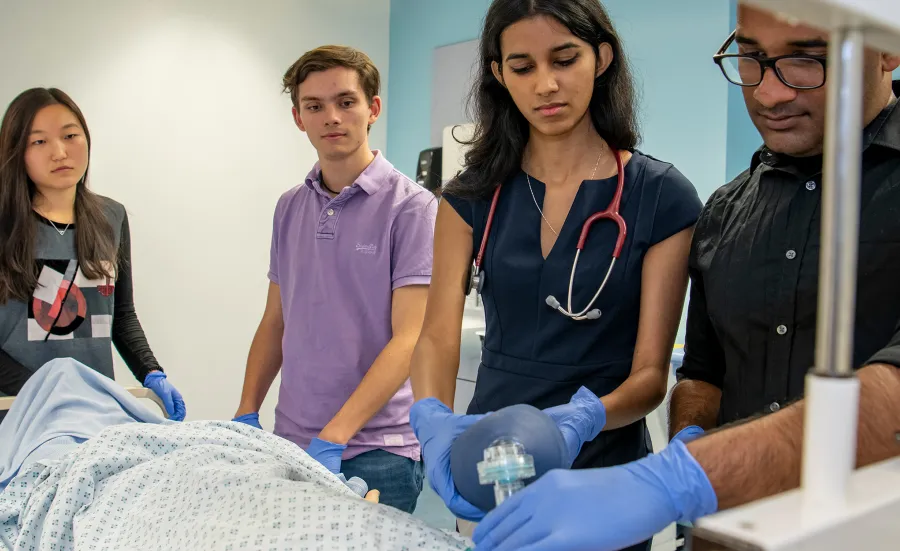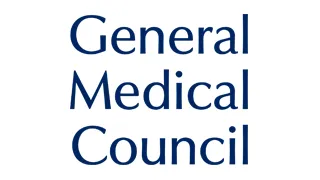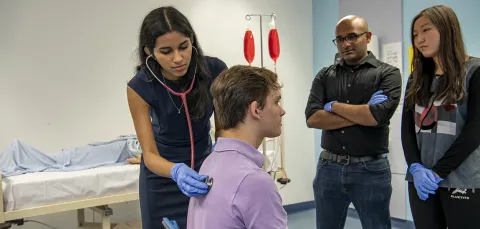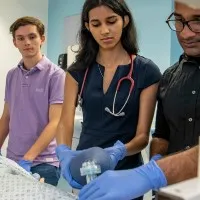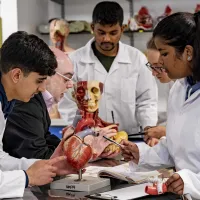About this course
The Bachelor of Medicine, Bachelor of Surgery (BMBS) Medicine is a 4-year graduate-entry degree. You can apply with any 2:1 degree or equivalent qualification, including arts and humanities degrees.
You'll join a small cohort of graduates working intensively to complete your studies in 4 years rather than 5. As a group you’ll work together, drawing on your existing knowledge to share experiences and identify areas to focus on.
In the first 2 years, the course is based around clinical topic weeks which take place in local NHS hospitals and GP practices. You’ll work on real medical cases, meeting patients and collaborating to solve problems.
In the final 2 years, you'll study alongside students from the BM5 and BM6 degrees. You'll undertake placements with a range of healthcare providers including hospital trusts, GP surgeries, the ambulance service and 3rd sector organisations.
As part of your medicine degree you'll:
- engage with guest speakers, expert patients and real patients on wards
- benefit from support from personal academic tutors, our faculty senior tutor team, peer support and mentoring
- take a student assistantship module where you'll work as an apprentice FY1 doctor
- choose an elective, clinical placement, research or educational project in your final year
We offer a number of places to this BM4 programme for graduates from the University of Southampton. Applicants must meet both the non-academic and academic criteria for this programme.
We regularly review our courses to ensure and improve quality. This course may be revised as a result of this. Any revision will be balanced against the requirement that the student should receive the educational service expected. Find out why, when, and how we might make changes.
Our courses are regulated in England by the Office for Students (OfS).
Accreditations
Learn more about this subject area

You start seeing patients right from the start, which can seem daunting, but it allows you to feel comfortable in clinical settings from the start.
Course location
This course is based at Highfield.
Awarding body
This qualification is awarded by the University of Southampton.
Download the Course Description Document
The Course Description Document details your course overview, your course structure and how your course is taught and assessed.
Entry requirements
For Academic year 202627
Eligibility Criteria
Applicants must be 18 or over at the start of the course.
Only Home students are eligible, International applicants must apply to BM5.
Applicants must meet the Degree and GCSE academic entry requirements listed below.
All applicants must sit the UCAT test before the 15th October UCAS deadline. Applicants must take UCAT in the year they are applying.
Degree
Graduate applicants (for BM4 and BM5) are required to achieve an Upper Second-Class Honours (2.1) in their first degree, this must be equivalent to a UK Honours degree. The degree can be in any subject and no preference will be given to applicants based on the subject taken.
Please note we do not have any A Level requirements for graduate applicants (for BM4 and BM5).
Please see below for GCSE requirements.
Other requirements
GCSE requirements
Graduate applicants (for BM4 and BM5) must hold 4 GCSEs at grade C/4 or above, including English language, mathematics and either biology and chemistry, combined science, or science and additional science.
You might meet our criteria in other ways. Find out more about our Admissions Policy.
Non-academic entry requirements
UCAT
All applicants must take the University clinical aptitude test (UCAT) prior to the 15th October medicine application deadline. Please visit ucat.ac.uk for further details about the test.
Selection to Interview
All applicants who meet the academic entry requirements through either achieved or predicted grades at the point of application are ranked by UCAT score and the top number of applicants invited to interview. Please see the ''How to apply'' tab for further interview details.
Non- academic Entry requirements
In addition to academic entry requirements, the selectors will look for evidence of non- academic criteria during the selection process.
At interview applicants must be able to show they;
• Are self -motivated and resilient
• Have reflected on and learnt from life experiences (this may include work experience, paid employment and personal experiences both in and outside health and social care settings)
• Can communicate effectively
• Are able to interact successfully with others
• Can demonstrate an understanding of the values of the NHS Constitution
Offers
Offers are made based on interview performance. UCAT will be used post interview if there is a tie between applicants selection day scores.
Additional Requirements
If you are offered a place after attending an interview you will need to meet the following requirements along with any academic conditions:
Certificates
Supply official copies of certificates for all completed qualifications listed in your offer.
Health Clearance
Occupational Health Completion and confirmation of a satisfactory health screening, including confirmation of appropriate vaccinations, will be a condition of all offers. All students must comply with the vaccination requirements of the programme which must be met in order to undertake placements. The list of vaccinations required is updated by the NHS and may change over the course of your programme.
DBS
All incoming students will be subject to an enhanced Disclosure and Barring Service Check (DBS) as part of the induction process. This is a legal requirement for those involved in contact with children or vulnerable adults.
Got a question?
Please contact our enquiries team if you're not sure that you have the right experience or qualifications to get onto this course.
Email: enquiries@southampton.ac.uk
Tel: +44(0)23 8059 5000
Course structure
The 4 years of the course are described as years 1, 2, 4 and 5. Years 1 and 2 are bespoke to BM4 and the final 2 years are taught alongside years 4 and 5 of BM5 and BM6.
The course is split into 4 phases:
- the fundamentals of medicine
- progression into clinical practice
- developing clinical practice
- preparing for independent practice
You'll get clinical experience from the first weeks of your course. This may involve some weekend and evening working.
You must pass all the course modules to progress to the next stage and graduate.
Year 1 overview
You'll begin phase 1 'the fundamentals of medicine' which takes place over 18 months and made up of 3 university semesters.
You'll develop your understanding of the role of a doctor as a practitioner and a professional. From the beginning, you'll meet patients and learn in the context of primary medical care and hospital-based medicine. You'll work in graduate groups to apply problem-solving skills, with the help of a facilitator.
Your learning will be focused on a series of clinical topics including:
- start in life
- congenital disorders
- breast cancer
- metabolic disorders
- cardiac function
Year 2 overview
You'll complete phase 1 and study clinical topics including:
- arthritis
- stroke
- chronic neurological disorders
- depression
- endocrine disorders
- reproductive health
You'll move in to phase 2 'progression into clinical practice'. Full-time clinical attachments start after Christmas, when you'll undertake a 6-week placements in medicine, surgery and primary care.
Year 3 overview
Phase 3, 'developing clinical practice', takes place through year 3 over 37 weeks. It continues through the first half of year 5 and ends with the year 5 exams. During year 4, your studies and clinical practice will include the following topics:
- acute care
- child health
- medical ethics and law
- obstetrics and gynaecology and genitourinary medicine
- psychiatry
There will also be speciality weeks in neurosciences, dermatology, head and neck, and ophthalmology.
Year 4 overview
You'll continue with phase 3 which includes clinical placements in medicine, surgery and primary care.
After finals you'll move into phase 4, 'preparing for independent practice'.
You'll complete a 6-week assistantship module in Medicine and Surgery. This will prepare you for entering the Foundation Programme as a newly qualified doctor in August.
For your student selected unit you can choose from:
- an elective placement abroad or in the UK
- a clinical placement
- a research or education project
Want more detail? See all the modules in the course.
Modules
The modules outlined provide examples of what you can expect to learn on this degree course based on recent academic teaching. As a research-led University, we undertake a continuous review of our course to ensure quality enhancement and to manage our resources. The precise modules available to you in future years may vary depending on staff availability and research interests, new topics of study, timetabling and student demand. Find out why, when and how we might make changes.
For entry in academic year 2026 to 2027
Year 1 modules
You must study the following modules in year 1:
BM4 Y1 Foundations of Medicine
The BM4 course in years 1 and 2 is a highly contextualised and integrated course in which the application of knowledge and understanding, clinical skills and professional practice applicable to medicine are learned through clinical topic weeks in which st...
Clinical Medicine 1
The BM4 course in years 1 and 2 is a highly contextualised and integrated course in which the application of knowledge and understanding, clinical skills and professional practice applicable to medicine are learned through clinical topic weeks in which st...
Year 2 modules
You must study the following modules in year 2:
Applied Knowledge Assessment (MCQ) Y2 BM4
Applied Knowledge Assessment (MCQ) for BM4 Y2
Clinical Medicine 2
The BM4 course in years 1 and 2 is a highly contextualised and integrated course in which the application of knowledge and understanding, clinical skills and professional practice applicable to medicine are learned through clinical topic weeks in which st...
Foundations of Medicine 2
The BM4 course in years 1 and 2 is a highly contextualised and integrated course in which the application of knowledge and understanding, clinical skills and professional practice applicable to medicine are learned through clinical topic weeks in which st...
Integration of Knowledge and Clinical Medicine 2
The BM4 course in years 1 and 2 is a highly contextualised and integrated course in which the application of knowledge and understanding, clinical skills and professional practice applicable to medicine are learnt through clinical topic weeks, in which st...
Medicine, Surgery and Primary Care
The BM4 course in years 1 and 2 is a highly contextualised and integrated course in which the application of knowledge and understanding, clinical skills and professional practice applicable to medicine are learned through clinical topic weeks in the firs...
Year 3 modules
You must study the following modules in year 3:
Acute Care Year 4
This module focuses on the Acute Care knowledge and understanding, practitioner and professional skills required of an F1 doctor, and the assessments within this module will focus on these areas. The BM programmes are however highly contextualised and ...
Applied Knowledge Test (AKT) yr 4
This is a synoptic assessment module that comprises the two MCQ Papers at the end of the year along with revision sessions that help prepare students for this assessment. The BM programmes are highly contextualised and integrated programmes in which t...
Child Health
This module focuses on the Child Health knowledge and understanding, practitioner and professional skills required of an F1 doctor, and the assessments within this module will focus on these areas. The BM programmes are however highly contextualised an...
Clinical Professional Skills Assessment (CPSA)
This module comprises the clinical professional skills assessment (CPSA) and supporting revision sessions. The assessment has been developed to ensure compliance with the GMC medical licensing clinical professional skills assessment requirements and has b...
Medical Ethics & Law year 4
This module will run throughout the year with a variety of activities occurring during the placements of other clinical modules in year 4. Teaching will take place within the clinical module placement hours. This module focuses on developing the critical ...
Obstetrics and Gynaecology and Genitourinary Medicine (O and G and GUM)
This module focuses on the Obstetrics & Gynaecology and Genitourinary Medicine ( for BM(EU) also Urology) knowledge, understanding and professional skills required of an F1 doctor, and the assessments within this module will focus on these areas. The ...
Psychiatry
This module focuses on the Psychiatry knowledge and understanding, practitioner and professional skills required of an F1 doctor, and the assessments within this module will focus on these areas. The BM programmes are however highly contextualised and...
Specialty Weeks (Dermatology, Head & Neck, Neurosciences & Ophthalmology)
This module focuses on the dermatology, neurosciences, ophthalmology and head & neck knowledge and understanding, practitioner and professional skills required of an F1 doctor, and the assessments within this module will focus on these areas. The BM p...
Year 4 modules
You must study the following modules in year 4:
Applied Knowledge Assessment (Final)
This module is a synoptic assessment module incorporating all previous modules in the programme and constitutes the Applied Knowledge Assessment (AKT) component of ‘Finals’. This module comprises the Applied Knowledge Assessment (currently MCQ format...
Assistantship FY
The Student Assistantship is a six week clinical placement undertaken in the last six months of Final Year. It is a transitional bridge to prepare students for practicing as competent Foundation Doctors. The module will normally take the format of a 6 ...
Medicine (Final)
This module provides the students with the opportunity to develop the knowledge, skills and attitudes which are necessary to practice in Medicine as a newly qualified doctor. This module builds on earlier learning throughout the programme. This module...
Personal and Professional Development FY
The module provides students with the opportunity to translate the GMC’s Good Medical Practice 2024 principles into day to day clinical practice in a variety of settings. This module focuses on the practitioner and professional skills, knowledge, under...
Primary Medical Care (Final)
This module focuses on the knowledge and understanding, practitioner and professional skills required of a newly qualified doctor in Primary Care, and the assessments within this module will focus on these areas. The BM programmes are integrated programme...
Student Selected Unit (Final) (elective, clinical placement, research, education, supplementary)
This module is an opportunity for you to gain experience of your choice outside the core programme. This may be in the UK or overseas, and may include an elective, local clinical placement, or a research or education project. Students can also explore a ...
Surgery (Final)
This module provides the students with the opportunity to develop the knowledge, skills and attitudes which are necessary to practice in Surgery as a newly qualified doctor. This module builds on earlier Surgical attachments and the Acute Care and Ethics ...
Workplace Based Assessment (Final)
This module is a synoptic assessment module incorporating all previous modules in the programme and together with the other 3 assessment modules constitutes ‘Finals’. This module comprises Workplace Based Assessment (WpBA) component of Finals. This in...
Learning and assessment
The learning activities for this course include the following:
- lectures
- classes and tutorials
- coursework
- independent learning (studying on your own)
Course time
How you'll spend your course time:
Year 1
Study time
Your scheduled learning, teaching and independent study for year 1:
How we'll assess you
- oral presentations
- portfolios
- written and practical exams
- placement assessment
Your assessment breakdown
Year 1:
Year 2
Study time
Your scheduled learning, teaching and independent study for year 2:
How we'll assess you
- oral presentations
- portfolios
- written and practical exams
- placement assessment
Your assessment breakdown
Year 2:
Academic support
You’ll be supported by a personal academic tutor and have access to a senior tutor.
Course leader
Benjamin Chadwick is the course leader.
Careers and employability
Employability skills
This degree will allow you to develop and evidence subject-specific and targeted employability skills. This includes the required skill set for a range of future careers, further study, or starting your own business.
The skills you can expect to focus on and gain from this course include:
- Research
- Critical thinking
- Self-management
- Confidence
- Communication
- Teamwork
- EDI leadership
- Adaptability
- Problem solving
- Resilience
The employability and enterprise skills you'll gain from this course are reflected in the Southampton skills model. When you join us you'll be able to use our skills model to track, plan, and benefit your career development and progress.
Download skills overview
Career pathways
Graduates commonly work in a range of organisations or sectors including:
NHS,
Private healthcare establishments,
HE Institutions,
Pharmaceutical companies,
Medical Research Laboratories,
Clinical trial organisations,
Residential nursing homes,
Air ambulance services,
Overseas aid agencies,
The armed Forces,
Prisons.
- General practitioner
- Anaesthetist
- Cardiologist
- Clinical radiologist
- Neurologist
- Ophthalmologist
- Psychiatrist
- Paediatrician
- Oncologist
- Urologist
- Academic researcher
- Clinical scientist
- Epidemiologist
- Pharmacologist
- Medical sales representative
- Medical writer
- Toxicologist
- Lecturer
- Management consultant
- Medicolegal adviser
- Doctor
- Research manager
- Clinical scientist
- Bioinformatics consultant
- Genetics consultant
- Data analyst
- Genetics scientist
- Research fellow
Job prospects for BM4 Medicine graduates
*Example graduate job titles and job prospect statistics taken from The Graduate Outcomes Survey, which gathers information about the activities and perspectives of graduates 15 months after finishing their course.

Work experience opportunities
Choosing to do work experience is a great way to enhance your employability, build valuable networks, and evidence your potential. Learn about the different work and industry experience options at Southampton.
Careers services and support
We are a top 20 UK university for employability (QS Graduate Employability Rankings 2022). Our Careers, Employability and Student Enterprise team will support you. This support includes:
- work experience schemes
- CV and interview skills and workshops
- networking events
- careers fairs attended by top employers
- a wealth of volunteering opportunities
- study abroad and summer school opportunities
We have a vibrant entrepreneurship culture and our dedicated start-up supporter, Futureworlds, is open to every student.
Your career ideas and graduate job opportunities may change while you're at university. So it is important to take time to regularly reflect on your goals, speak to people in industry and seek advice and up-to-date information from Careers, Employability and Student Enterprise professionals at the University.
Fees, costs and funding
Tuition fees
Fees for a year's study:
- UK students pay £9,535.
- This course is not available to EU and international students.
What your fees pay for
Your tuition fees pay for the full cost of tuition and all examinations.
Find out how to:
You will be responsible for paying certain costs not covered by the tuition fee. These include:
- vaccinations and immunisation
- £100 per year towards travel costs associated with clinical placements
- medical insurance if you choose to do an elective in another country
Accommodation and living costs, such as travel and food, are not included in your tuition fees. There may also be extra costs for retake and professional exams.
Explore:
Bursaries, scholarships and other funding
If you're a UK or EU student and your household income is under £36,200 a year, you may be able to get a University of Southampton bursary to help with your living costs. Find out about bursaries and other funding we offer at Southampton.
If you're a care leaver or estranged from your parents, you may be able to get a specific bursary.
Get in touch for advice about student money matters.
Scholarships and grants
You may be able to get a scholarship or grant to help fund your studies.
We award scholarships and grants for travel, academic excellence, or to students from under-represented backgrounds.
Support during your course
The Student Hub offers support and advice on money to students. You may be able to access our Student Support fund and other sources of financial support during your course.
How to apply
What happens after you apply?
We’ll assess your application on the strength of your:
- predicted or actual grades
- University Clinical Aptitude Test (UCAT) scores
- performance at a selection day
Please note: your reference is not used as part of the selection process, but you must provide it as part of your application.
Selection days
We rank applicants by UCAT score and invite the top candidates to one of our selection days.
We offer a number of interview places to the BM4 programme for graduates from the University of Southampton.
The selection day process includes an interview and a group task. At the interview, we draw on the information you gave us in your application personal statement.
During the selection process you must show how you meet our non-academic criteria by demonstrating that you:
- are self-motivated and resilient
- have reflected on relevant life experiences
- can communicate effectively
- can interact successfully with others
- understand the values of the NHS constitution
Selection day invitations
If you’re invited to attend, we’ll email you full event details beforehand.
Applicants will be invited to attend 2 to 3 weeks before the selection day.
We're unable to offer an alternative date to the one on your invitation. However, if another applicant cancels their place, we sometimes send invitations with a shorter notice period.
2026 selection day dates
You must attend your interview in person, due to the format of our selection process we do not offer online alternatives.
- Thursday 29 January
- Friday 30 January
- Wednesday 4 February
Application decision
We aim to respond to you by the end of March with a decision about your application.
Offers are made based on Selection day performance. Where selection days scores are tied we may use UCAT as a determining factor between candidates.
Selection Policy
Download our full selection policy for 2026 entry (ODT, 80KB)
Inside Uni Medicine
Inside Uni Medicine is a free resource supported by the Medical Schools Council and NHS England, and delivered in partnership with Inside Uni; a community of students sharing advice on applying to university.
It gives advice from current students sharing their tips for applicants on applying to university including students from underrepresented backgrounds.
Equality and diversity
We treat and select everyone in line with our Equality and Diversity Statement.
Got a question?
Please contact our enquiries team if you're not sure that you have the right experience or qualifications to get onto this course.
Email: enquiries@southampton.ac.uk
Tel: +44(0)23 8059 5000
Related courses
Medicine BM4 Graduate Entry (BMBS) is a course in the Medicine subject area. Here are some other courses within this subject area:
